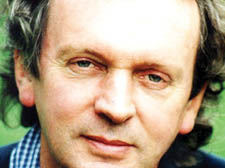|
|
 |
| |

Rupert Sheldrake |
Telepathy goes head to head with science
Paranormal expert Rupert Sheldrake is putting his beliefs under scientific scrutiny.
TELEPATHIC power is a gift we all have. In some, like the ability to sing or dance, the gift is more pronounced, but we all have a range of extra sensory perceptive powers.
This is the belief of Hampstead-based researcher and academic Rupert Sheldrake, whose life’s research is dedicated to putting these claims under rigorous scientific evaluation. And he claims he has gathered evidence to prove that the paranormal exists, evidence he believes could change the world.
This issue is set to come under the microscope this weekend at Conway Hall, Holborn, when psychologist Professor Chris French, from Goldsmiths College, considers Mr Sheldrake’s claims.
Prof French says: “I am intrigued by what he has to say. He is articulate and persuasive. I have seen him talk and he is a cut above your average wide-eyed believer.
“Mr Sheldrake says he has evidence to back up what he is claiming, but this means it challenges the whole gamut of modern scientific research and understanding.
“It either means he is a fraud, and you can’t rule that out, or it might mean his experiments are wrong, or finding patterns in his data by playing around with them.”
In the other corner, Rupert Sheldrake says sceptics are doing science a dishonour by not paying careful consideration to such controversial fields.
He says it is because of an ingrained, dogmatic belief system that holds back science from tackling such areas as telepathy, extra sensory perceptions and telekinesis – the ability to move objects using just the power of the mind.
“Scientists often treat this type of research with disdain, but I have conducted rigorous experiments,” Mr Sheldrake says.
Rupert Sheldrake has a science background. An eminent biologist and author in his own right, he studied at Cambridge and Harvard.
Mr Sheldrake, who lives in Willow Road, Hampstead and is on the Heath and Hampstead Society’s Heath management sub-group.
He regularly takes groups for walks over the Heath to point out interesting plants, moved from the study of plants into the realm of studying animals and whether there was such a thing as animal telepathy, and from there he widened his experiments to cover humans too.
He asks: “Have you ever thought about some one for no apparent reason, and then that person rang on the telephone? Have you ever felt you are being watched, and then turned round to find someone staring at you?”
Mr Sheldrake believes this happens to everyone, and if there is more to it than coincidence suggests, then the mind has powers that have not been properly understood.
He has concluded there is evidence that telepathy is real. Its evolutionary cause, he believes, is that animals which possessed such powers were better able to defend themselves against predators.
Or there are other biological reasons, such as acting as a means of communication between animal groups spread out over long distances.
He believes our pets often demonstrate telepathy. “Many dogs seem to know when their owners are coming home, and go to wait at a door,” Mr Sheldrake says.
“In some cases they do this when the person is still miles away, long before the animal could have heard familiar footsteps or car sounds. In a series of videotaped tests,
“I found that dogs still went and waited at the door when the owners returned at times randomly selected, when no one at home knew when they were coming, and when they travelled in unfamiliar vehicles such as taxis.”
And he says that the fact the mind remains full of mystery means his findings must not be dismissed. He says: “The conventional idea that mental activity is nothing but brain activity is only an assumption, not a proven fact.
“I suggest our minds may extend far beyond our brains, stretching out through fields that link us to our environment and to each other.
“Mental fields could help to explain telepathy, the sense of being stared at and other widespread but unexplained abilities. Of course this hypothesis is controversial. B
“But science progresses not through dogma and polemic, but by exploring new possibilities and by paying attention to the evidence.”
Professor French is doing his best, as a confirmed sceptic, to approach Mr Sheldrake’s research with an open mind. He admits he does not believe in the paranormal – because the evidence he has seen is flimsy.
“Mr Sheldrake’s work needs to be independently considered to either back it up or point out where there might have been mistakes made,” Professor French says.
This had led to Professor French and his colleagues offering to fund further tests, in conjunction with Mr Sheldrake, to see if the results are possible to reproduce with Professor French as an independent adjudicator.
As a psychologist, Professor French believes there are important philosophical ideas behind these ideas – if telepathy is a myth, then why humans believe in such unproven ideas is interesting in itself.
He said: “Either paranormal forces exist, and if so that’s an immense scientific breakthrough. If not, it is telling us a lot about human psychology.
“There are these types of believers in every society through out history, and there is something going on that is clearly an important part of being a human being.”
• YOU can catch a programme about Mr Sheldrake’s work on ITV this Tuesday. “The Man With the Extended Mind’ starts at 7.30pm.
Mr Sheldrake’s books include ‘Seven Experiments That Could Change the World: A Do-It-Yourself Guide to Revolutionary Science’ and ‘Dogs That Know When Their Owners Are Coming Home: And Other Unexplained Powers of Animals: An Investigation’.
Try Rupert Sheldrake’s new text telepathy test.
Visit http://www.sheldrake.org/Onlineexp/portal/textexp.html.
• Professor Chris French discusses Telepathy and Rupert Sheldrake’s work at the South Place Ethical Society, Conway Hall, Red lion Square, at 11am on Sunday.
|
 |
|
 |
|

